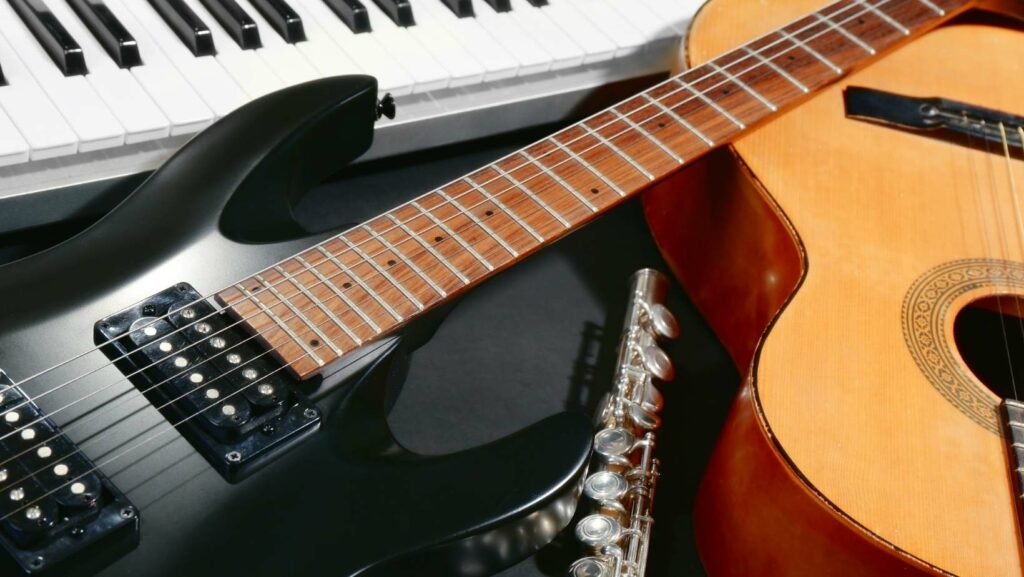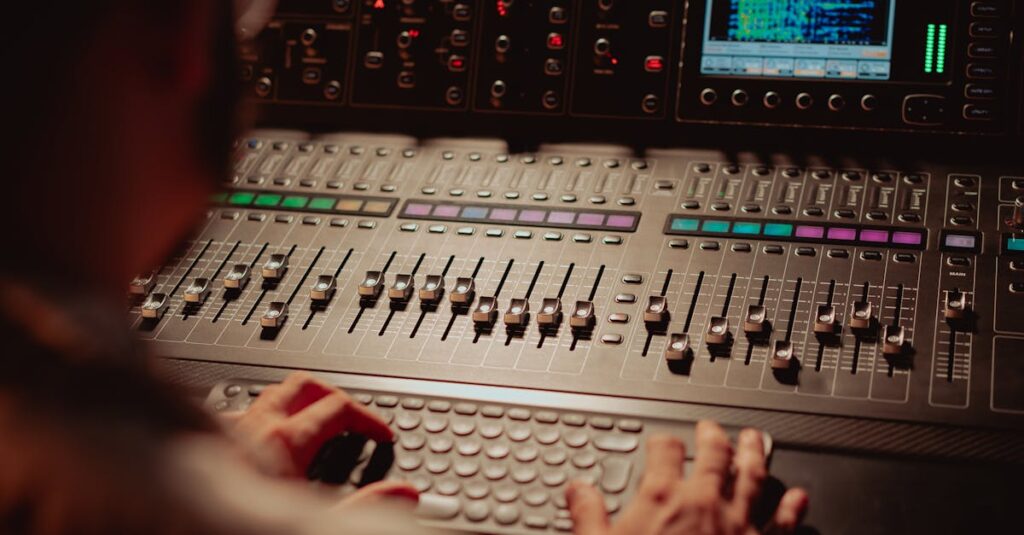Music production has evolved into one of the most dynamic and sought-after career paths in the entertainment industry. As technology continues to reshape how music is created produced and distributed aspiring producers need comprehensive education to succeed in this competitive field.
For students passionate about turning their love of music into a professional career numerous colleges across the United States offer specialized music production programs. These institutions combine traditional music theory with cutting-edge technology training providing students with hands-on experience in professional-grade recording studios. From basic audio engineering to advanced digital production techniques these programs prepare graduates for diverse roles in the music industry.
Colleges With Music Production Majors
Music production majors combine technical audio engineering skills with creative musical composition. Students learn audio recording techniques, digital workstation operation, sound design principles, mixing methods and music business fundamentals.
Core Curriculum Components
A music production degree program includes these essential areas:
- Audio Engineering: Signal flow, microphone placement techniques, acoustics fundamentals
- Digital Production: DAW operation, MIDI sequencing, virtual instruments, sampling
- Music Theory: Harmony, rhythm analysis, arrangement principles, orchestration
- Business Skills: Copyright law, publishing rights, marketing strategies, project management
- Technical Skills: Studio maintenance, troubleshooting, equipment calibration
Career Applications
Music production graduates enter diverse professional roles:
| Career Path | Average Starting Salary | Growth Rate |
|---|---|---|
| Sound Engineer | $47,500 | 8% |
| Music Producer | $51,200 | 6% |
| Studio Manager | $55,300 | 7% |
| Post-Production | $49,800 | 9% |
Required Equipment & Technology
Standard tools music production students master include:
- Digital Audio Workstations: Pro Tools, Logic Pro, Ableton Live
- Audio Interfaces: Universal Audio, Focusrite, PreSonus
- Studio Monitors: Yamaha HS series, KRK Rokit, Adam Audio
- Microphones: Shure SM57, Neumann U87, AKG C414
- MIDI Controllers: Native Instruments, Akai, Arturia
- Professional Studio Sessions
- Industry Guest Lectures
- Internship Placements
- Client Projects
- Portfolio Development
- Equipment Certifications
Top Schools for Music Production Programs
Leading music production programs combine industry connections technical facilities professional faculty expertise to prepare students for successful careers in the music industry. Here’s an analysis of three prominent institutions known for their exceptional music production education.
Berklee College of Music
Berklee College of Music in Boston offers a comprehensive Bachelor of Music in Music Production & Engineering. The program features 12 professional recording studios 5 mix suites multiple ISO rooms. Students gain hands-on experience with SSL Neve API consoles while working on real-world projects. The curriculum incorporates:
- Recording techniques across multiple genres: rock jazz classical electronic
- Advanced mixing mastering methodologies using industry-standard tools
- Studio design acoustics signal flow optimization
- Collaboration opportunities with performers songwriters engineers
Full Sail University
Full Sail University’s Recording Arts degree program operates from Winter Park Florida providing accelerated 20-month completion tracks. The campus includes:
| Facility Type | Number | Features |
|---|---|---|
| Recording Studios | 8 | SSL Neve consoles |
| Live Venues | 2 | Full production capability |
| Mix Rooms | 110 | Pro Tools workstations |
| Labs | 22 | Audio electronics |
Students complete 3000+ hours of hands-on training participate in 30+ production projects graduate with both technical certifications industry credentials.
New York University
NYU’s Clive Davis Institute of Recorded Music delivers a four-year program emphasizing both creative production business acumen. The facilities include:
- 6 professional recording studios equipped with Avid S6 consoles
- Multiple production suites featuring analog digital hybrid setups
- Electronic music labs with vintage modern synthesizers
- Dedicated mastering suite with specialized monitoring systems
The program connects students with 200+ industry professionals annually through masterclasses workshops internship placements at major record labels production houses.
Essential Skills Taught in Music Production Programs
Music production programs equip students with specialized skills through comprehensive coursework and hands-on training. These programs focus on developing both technical expertise and creative abilities to prepare graduates for professional careers in the music industry.
Technical Production Skills
Music production students master essential technical skills through hands-on training with industry-standard equipment:
- Operating digital audio workstations (DAWs) like Pro Tools, Logic Pro X, Ableton Live
- Recording techniques including microphone placement, gain staging, signal routing
- Mixing processes such as EQ adjustments, compression, effects processing
- Sound design using synthesizers, samplers, virtual instruments
- Studio equipment maintenance and troubleshooting
- Audio signal flow optimization in analog and digital environments
- Live sound reinforcement and stage monitoring
- Audio post-production for film, television, podcasts
Music Theory and Composition
Students develop a strong foundation in musical concepts and creative composition techniques:
- Reading and writing musical notation
- Chord progressions and harmonic analysis
- Rhythmic patterns and time signatures
- Song structure and arrangement techniques
- Melodic development and counterpoint
- Genre-specific production styles
- Contemporary composition methods
- Digital orchestration and MIDI programming
- Critical listening and sonic analysis
- Beat making and electronic music composition
| Skill Category | Course Hours | Practical Training % |
|---|---|---|
| Technical Production | 480 | 70% |
| Music Theory | 320 | 40% |
| Composition | 280 | 60% |
Career Opportunities After Graduation
Music production graduates enter a diverse job market with positions spanning studio work, live events, broadcasting, gaming, and film industries. The U.S. Bureau of Labor Statistics reports a 13% growth rate in media and entertainment jobs through 2029.
Studio Production Roles
Studio production careers encompass multiple specialized positions in professional recording environments:
- Recording Engineers operate consoles, capture audio sessions, and maintain studio equipment
- Mix Engineers blend multiple audio tracks, adjust levels, and apply effects processing
- Mastering Engineers optimize final audio for various distribution formats
- Music Producers oversee creative direction, arrange compositions, and manage recording sessions
- Studio Managers coordinate bookings, maintain facilities, and supervise technical staff
| Studio Role | Median Annual Salary | Entry-Level Requirements |
|---|---|---|
| Recording Engineer | $52,000 | Bachelor’s degree + 1-2 years experience |
| Mix Engineer | $58,000 | Bachelor’s degree + 2-3 years experience |
| Music Producer | $68,000 | Bachelor’s degree + 3-5 years experience |
| Studio Manager | $62,000 | Bachelor’s degree + 4-5 years experience |
- Front of House Engineers control main audience sound mix
- Monitor Engineers manage on-stage sound for performers
- System Technicians set up and maintain sound reinforcement equipment
- Production Managers coordinate technical requirements for live events
- Tour Sound Engineers travel with performing artists
| Live Sound Role | Average Event Rate | Annual Income Range |
|---|---|---|
| FOH Engineer | $350-800/show | $45,000-95,000 |
| Monitor Engineer | $300-600/show | $42,000-85,000 |
| System Tech | $250-500/show | $38,000-75,000 |
| Tour Sound | $1,200-2,500/week | $52,000-120,000 |
Program Costs and Financial Aid Options
Music production degree programs at accredited institutions range from $15,000 to $45,000 per year in tuition costs. Private institutions like Berklee College of Music charge $48,120 annually, while public universities like Middle Tennessee State University cost $23,712 for out-of-state students.
Tuition and Additional Expenses
| Expense Category | Average Annual Cost |
|---|---|
| Tuition (Public) | $23,000 – $35,000 |
| Tuition (Private) | $35,000 – $50,000 |
| Studio Fees | $1,500 – $3,000 |
| Equipment | $2,000 – $4,000 |
| Software Licenses | $500 – $1,200 |
Financial Aid Resources
Students access multiple funding sources for music production education:
- Federal Grants: Pell Grants provide up to $6,895 per academic year
- Institutional Scholarships: Merit-based awards covering 15% to 50% of tuition
- Industry Sponsorships: Equipment manufacturers offer $2,500 to $10,000 grants
- Work-Study Programs: Campus recording studios employ students at $12-15 per hour
- Private Music Organizations: Professional associations distribute $1,000 to $5,000 awards
Program-Specific Scholarships
- Audio Engineering Society Scholarship: $5,000 annual award
- SPARS Education Foundation Grant: $2,500 per semester
- BMI Foundation Awards: $3,000 for student composers
- Grammy U Scholarships: $5,000 – $10,000 per academic year
- MPE Excellence Awards: Full tuition coverage at select institutions
- Monthly Payment Plans: Divide annual tuition into 8-12 installments
- Federal Direct Loans: Fixed interest rates at 4.99% for undergraduates
- Private Student Loans: Variable rates from 3.22% to 12.78%
- Parent PLUS Loans: Fixed 7.54% interest rate with credit approval
- Income Share Agreements: 3-8% of post-graduation income for 24-48 months
Choosing the Right Colleges With Music Production Majors
Selecting an appropriate music production program requires evaluating key factors that impact educational quality and career preparation. The decision process involves assessing specific elements that contribute to a comprehensive music production education.
Campus Facilities and Equipment
Modern music production facilities form the foundation of hands-on learning experiences. Professional-grade recording studios feature:
- Pro Tools HD systems with minimum 48-channel mixing consoles
- Isolation booths equipped with acoustic treatment
- Industry-standard microphone collections (Neumann U87 AIs Shure SM7Bs AKG C414s)
- Analog processing gear including compressors equalizers preamps
- Multiple control rooms for simultaneous recording sessions
- Post-production suites with 5.1 surround sound capabilities
- MIDI labs with 25+ workstations running current DAW software
- Equipment checkout systems for student projects
Industry Connections
Strong industry partnerships enhance career opportunities through:
- Internship programs with major recording studios (Capitol Records Abbey Road Electric Lady)
- Guest lecture series featuring Grammy-winning producers engineers
- Industry mentorship programs pairing students with professionals
- Networking events connecting students to label executives publishers
- Alumni networks in key music production markets (LA Nashville NYC)
- Partnership agreements with audio technology manufacturers
- Recording label collaborations for student projects
- Annual career fairs with music industry employers
The facilities and connections sections maintain focus on tangible resources while providing specific examples students encounter in top programs. Each element connects directly to professional skill development without unnecessary elaboration or personal opinions.
Music Production Degree
A music production degree opens doors to diverse career opportunities in the dynamic entertainment industry. From state-of-the-art recording facilities to expert faculty and industry connections top music production programs provide comprehensive education that blends technical expertise with creative artistry.
Students who choose this path gain essential skills in audio engineering digital production and music theory while building valuable industry relationships. With promising job growth rates competitive salaries and various financial aid options available pursuing a music production degree is a solid investment in a creative and rewarding future.
The combination of hands-on experience industry-standard equipment and professional networking opportunities prepares graduates to thrive in roles ranging from studio production to live sound engineering making music production an exciting and viable career choice.



